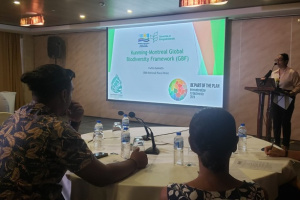Critical Ecosystem Partnership Fund approves grants for 3 conservation projects in Seychelles
The Blue Economy Research Institute (BERI) at the University of Seychelles, Indian Ocean Tortoises Alliance (IOTA) and the Seychelles Islands Foundation (SIF) have received approval for grant funding from the Critical Ecosystem Partnership Fund (CEPF).
Representatives from the three organisations officially signed the documents confirming their approval on Monday.
CEPF is a joint global initiative of several donor organisations and countries to support capacity building and research and conservation initiatives in several critical ecosystems globally.
The CEPF's focal point in Seychelles is the Seychelles Conservation and Climate Change Adaptation Trust (SeyCCAT).
The chief executive of SeyCCAT, Marie-May Jeremie, said, "CEPF is a worldwide organisation that works with many donors to provide funds for projects in different regions with high levels of biodiversity. Seychelles falls in the Madagascar and Indian Ocean region, and as part of this group, there is also Comoros and Mauritius. All benefit under this programme that started in 2022 and will continue until 2025. Every year we have several calls for NGOs to apply for funding."
The funding for BERI is classed as a small grant because it is just under $50,000 and will focus mainly within and adjacent to selected marine protected areas within the inner islands. This will include marine life as well as the sea floor.
 |
| IOTA received around $149,000 for its project to eradicate black rats on Curieuse Island National Park. (Seychelles National Parks Authority) Photo License: CC-BY |
A lecturer at BERI, Stuart Lang said, "The work we are doing is going beyond safe diving depths so we are going to find information that is perhaps new for other organisations and this is especially important for the development of new management plans. The technique we use is a remote underwater video system. It has two cameras with a bait box to attract the fish. The camera helps us measure the size of the fish and other organisms. The setup can go down to around 60 metres."
The other two organisations, IOTA and SIF will both be conducting rodent eradication on two islands of Seychelles.
IOTA received around $149,000 for its project to eradicate black rats on Curieuse Island National Park and its project director, Rich Baxter, said, "The impact that this will have on the island will be very positive, once the rats are removed. The populations of other species will improve."
Baxter said, "The rats eat everything and they reproduce very quickly, therefore, the impact of a highly dense population of rats on an island will devastate all species across the food web, the insects, tortoises and birds."
IOTA will be using a type of self-resetting trap for the project that is designed in a way that kills any rat and it can be used about 24 times before it needs to be reset again. There will be 400 of these traps dispersed around Curieuse.
Baxter confirmed that this project will take around two years to complete and this does not include the monitoring that will be needed after.
SIF is also planning to eradicate rats and cats from Aldabra, one of Seychelles' UNESCO World Heritage sites.
Dr Frauke Fleicher-Dogle, SIF' chief executive, said that due to the high cost of this project, estimated to be around €20 million, and the topography of Aldabra, SIF must do a feasibility study first and will receive about $300,000 from the CEPF.
"We have to be certain that the project will be successful to be able to justify the amount of funds needed. Therefore, with this grant, we'll be able to engage international and local expertise to do several trials over the period of two years," she added.
CEPF is a joint initiative of l'Agence Française de Développement, Conservation International, the European Union, the Global Environment Facility, the Government of Japan and the World Bank.






